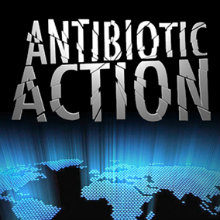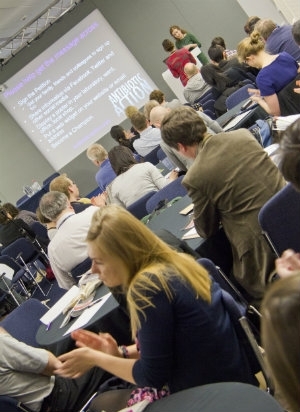Getting the message out … SGM leads the way on antimicrobial resistance
Issue: Sexually transmitted infections (STIs)
20 May 2013 article

Antimicrobial resistance … a catastrophic threat
On 11 March 2013, Dame Sally Davies, the Chief Medical Officer (CMO) for England, published Volume 2 of her Annual Report Infections and the rise of antimicrobial resistance.
In this report she makes 17 recommendations. These include better surveillance, the need for rapid diagnostics, better training, the role of vaccination and better management of antibiotic use. The CMO likened the threat of antibiotic resistance to that of terrorism, in that both are threatening global phenomena that require governments to act.
Nigel Brown, President of the SGM, was asked to comment on the report and backed Dame Sally’s comments stating that ‘Professor Dame Sally Davies rightly flags the issue of antimicrobial resistance to be of national and international concern. Urgent action is required by microbiologists and other scientists to identify and produce new antibiotics, and to tackle the problem of antibiotic resistance and its transmission’.
‘The SGM brought these issues to the attention of its members in the November 2012 issue of Microbiology Today. Our members will be working on understanding infectious disease processes, reducing transmission of antibiotic resistance, helping develop new antibiotics and educating the users of antibiotics about these issues. The techniques of microbiology and new developments such as synthetic biology will be crucial in achieving this.’
Professor Dame Sally Davies rightly flags the issue of antimicrobial resistance to be of national and international concern. Urgent action is required by microbiologists and other scientists to identify and produce new antibiotics, and to tackle the problem of antibiotic resistance and its transmission’
In addition to a quote in the Department of Health Press Release, Nigel was interviewed by BBC TV, BBC World and Sky News; his comments also received extensive media coverage, appearing in 32 online editions of national and international news media from the Mirror to the Independent. Nigel also responded, along with
other experts, to questions received from Channel 4 viewers after news bulletins. The answers were posted on their website www.channel4.com/news/superbugs- antibiotics-and-me-the-key-questions.
The theme of antibiotic resistance was highlighted further at the SGM Spring Conference where the theme of next-generation approaches to antimicrobial therapy was discussed by a panel of experts who took part in TWiM, which was live-streamed. Watch the episode below.
Other SGM members who also commented on the report were Christopher Thomas, Professor of Molecular Genetics, University of Birmingham, and Laura Piddock, Professor of Microbiology and Deputy Director of The Institute of Microbiology and Infection at the University of Birmingham, and Director of Antibiotic Action.
If you are interested in the issues surrounding antibiotic resistance, become an Antibiotic Action Champion. Champions are needed to get the message out and promote the importance of antibiotics, why they need to be used appropriately and why it is important for new agents to be developed. No experience is needed to become a Champion. Further information can be found at http://antibiotic-action.com/champions/
DARIEL BURDASS, SGM; Email d.burdass@microbiologysociety.org
Are we getting the message right?
The focus on antimicrobials and antimicrobial resistance at the Society’s Spring Conference 2013 could not have been more timely …
| Learn about the TARGET toolkit, a web-based educational resource housed on the General Practitioners website. Sign the petition and find out more at the Antibiotic Action website: Read abstracts from the talks at the SGM Spring Conference 2013 |
The Antibiotic resistance; are we getting the message right? session at the Spring Conference took place 2 weeks after CMO Dame Sally Davies described the growing concerns of antimicrobial resistance and the lack of new drugs as ‘a ticking time-bomb not only for the UK but also for the world’. Choosing to highlight this issue in her first annual report ensured that the attention of the public, the media, policy-makers, healthcare professionals and pharmaceutical companies remains focused on these concerns and the challenges they raise. Her report highlighted the role of education in combating antibiotic resistance in key user groups, a theme that emerged during the session.
Although scientists, clinicians and researchers continue to play a crucial role in the continuing battle against antibiotic resistance (also see the Next-generation antimicrobials and New approaches to exploit Streptomyces sessions at the Society’s Spring Conference 2013), delegates learned that more work still needs to be done to address the current issues in antibiotic resistance and the continual need for the development of new drugs. Drawing attention to this cause resulted in the launch of Antibiotic Action, a campaign that seeks to educate, inform and raise awareness about these pressing concerns. This campaign asks scientists to take an active role in raising awareness by signing a petition, seeking opportunities to highlight the issues of antibiotic resistance and becoming Antibiotic Action champions. The campaign has already resulted in more than 10,000 petition signatures and an Early Day Motion in the House of Commons.

Delegates who took part in this session also agreed that scientists should be doing more to raise awareness. Further suggestions included encouraging more scientists to move into government and lobbying for increased funding for research into next-generation antimicrobials. It was also highlighted that improved guidelines may be required for the controlled use and disposal of antibiotics in laboratory environments, including school laboratories that use them.
Talks in this session also focused on educational measures that are already in place in the UK, including the work of the Health Protection Agency, which has long understood the need for antimicrobial stewardship in primary care, including safe and effective antimicrobial prescribing. The session also considered whether enough is being done to educate the next generation of scientists and microbiologists about the issues of antimicrobial resistance and the dearth of new drugs on the horizon. Delegates mapped where biology students, including microbiology students, encounter antibiotics throughout their degree programmes in a workshop at the end of the session. Interestingly, Fresher’s Week and visits to campus GPs were picked up as an initial encounter experienced by a significant swathe of the undergraduate student population. The taught curricula, in general, cover antibiotics in lectures and tutorials that outline the mechanisms of natural selection in the environment, antibiotic biosynthesis and antibiotic resistance mechanisms and their use in combating bacterial infections. In addition, a significant amount of teaching involves the use of antibiotics in practical classes and research projects.
Although the message about the issues of increasing antibiotic resistance and decreasing antibacterial drug discovery already exist, the consensus was that there is room for improvement in this respect. Teaching should also cover the history of antibiotic discovery, the present day concerns and the future impacts in society associated with antibiotic resistance. In addition, teaching about antibiotics could be more cohesive throughout undergraduate curricula. Suggestions to facilitate this included improving teaching materials, including textbooks, and providing clearer safety guidelines on the use of antibiotics in practical classes and research projects. Finally, it was felt that guidelines for lecturers to teach about antibiotic resistance in a variety of curricula should be a necessary part of accreditation of biological sciences degree programmes
by learned societies.
LAURA BOWATER, University of East Anglia;
Email [email protected]
